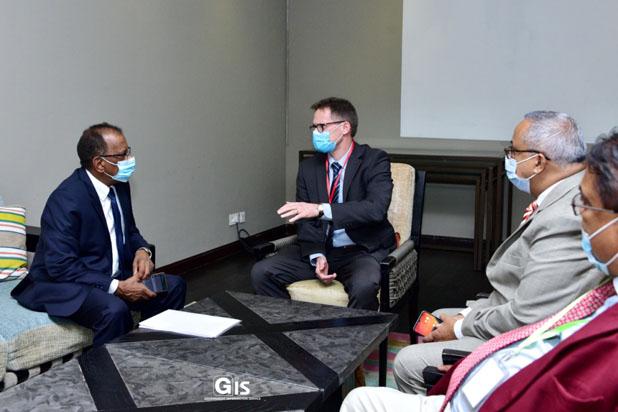Africa-Press – Mauritius. A one-day workshop focusing on ‘Mapping Manufacturing Skills for the Future’, opened, this morning at the Westin Turtle Bay Resort & Spa, in Balaclava.
The Minister of Industrial Development, SMEs and Cooperatives, Mr Soomilduth Bholah, and other personalities were present at the opening ceremony. The workshop was organised by the Industrial Development Division of the Ministry of Industrial Development, SMEs and Cooperatives.
The aim is to identify the current and future skills needs of the manufacturing sector so as to come up with concrete actions that will address the skills requirement to service the sector with a pool of qualified labour force.
It targeted some 90 participants from the public and private sectors as well as manufacturing enterprises. In his keynote address, Minister Bholah highlighted that the performance of the manufacturing sector is currently constrained due to a shortage of skills and skills mismatch for more than two decades now.
Hence, today’s workshop is of critical importance for the manufacturing landscape as the foundation to service the sector with a pool of technically qualified, technologically-savvy, creative and versatile human capital in the future is being laid, he pointed out.
The Minister recalled that his Ministry recently launched the Industrial Policy & Strategic Plan (2020-2025) for Mauritius, prepared with the technical assistance of the UNCTAD in a bid to converge together towards the elaboration of a common Skills Roadmap for the benefit of the manufacturing sector and above all, for enhanced economic prosperity.
This document, he added, charts out the strategic directions of the manufacturing sector and clearly spells out the availability of appropriate skills that constitutes one of the foundational requirements to sustain industrial growth.
Furthermore, Mr Bholah dwelt on how the manufacturing sector has evolved over time from being a producer of basic products into that of higher value-added activities such as high-end garments, medical devices, pharmaceuticals, automotive components, precision parts, technical textiles, sophisticated jewellery and optical products.
The sector, he noted, being an important pillar of the economy, contributes around 12.1% to Gross Value Addition and provides gainful employment to 90,400 workers, representing 16.4% of the total workforce. The Government, he reiterated, remains fully committed to support economic operators in their training and re-skilling endeavours.
To this end, a host of training schemes and incentives has been provided in Budget 2021/22 such as the launching of a National Apprenticeship Programme, the National Training and Reskilling Scheme, the extension of the Youth Employment Programme for another year, the expansion of the scope of the SME Graduate Scheme which will cater for vocational training and, the Dual Training Programme which will cover 60% of academic fees of employees.
According to him, Government is leaving no stone unturned to further diversify the sector into innovation-led and technology intensive activities, through the attraction of Foreign Direct Investment such as gold refinery, tyre recycling, pharmaceutical and leather products, despite the difficult prevailing circumstances with the COVID-19 crisis.
Furthermore, Minister Bholah stressed that there is a need to leverage on highly knowledgeable, capable, agile and efficient human capital so as to serve the evolving needs of our enterprises, improve productivity and, bolster competitiveness.
More importantly, he indicated that it is imperative to encourage youngsters who consider that this particular field of activity is characterised by low level manual jobs and the absence of rewarding career paths and work life balance, to pursue a career in manufacturing.
Enterprises today are faced with an ageing workforce and there is an inherent unwillingness of youngsters to join the manufacturing sector, he indicated.
On that score, the Minister enumerated on the new types of high skilled job opportunities that are emerging, namely: Agro-Engineers, Food Technologists, Industrial Mechanics & Maintenance Technicians, Biologists, Micro-Biologists, Scientists, Environmental Engineers, Data Scientists, as well as Professionals in technologies associated with Industry 4.0 such as Artificial Intelligence, Robotics, Internet of Things and, Machine Learning.
In addition, Mr Bholah emphasised that the promotion of Research & Development in the manufacturing sphere is another pre-requisite for enhanced competitiveness.
There is a need to reinforce our Science, Technology, Engineering and Mathematics (STEM) education capabilities to enable the creation of the next generation of innovators in the manufacturing sector so that in the long term they uplift the innovation quotient and capability of the sector and result into greater product differentiation and higher value-added, he pointed out.
Minister Bholah further indicated that the Fashion and Design Institute, which falls under the aegis of his Ministry, is playing a leading role in ensuring that the manufacturing industry, particularly sub-sectors such as textile and apparel, and jewellery are supported with a talented workforce endowed with creative minds.
On that score, he expressed hope that by implementing new skills imperatives, the Institute will prove to be a major catalyst in producing the required skill, capacity and entrepreneurial mindset for other emerging manufacturing activities.
The Minister recalled that radical changes were witnessed with the shift towards greater automation and flexible production systems to reduce costs and ensure competitiveness when employees were called upon to be agile and develop new products such as face masks, face shields and Personal Protective Equipment over a short lapse of time.
On that note, he urged stakeholders to maintain this momentum and ensure that the manufacturing labour force continues to upgrade their skills for greater efficiency and versatility.
For More News And Analysis About Mauritius Follow Africa-Press







